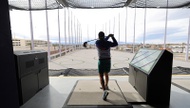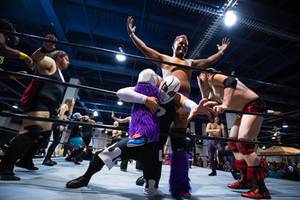In performances at three Olympics, Steffen Peters’ feet never touched the ground. He’s a horseman of the highest order, and one Las Vegas might remember from the last time World Cup Dressage was held here, in 2009, when Peters won it all.
Born in Germany, he began riding at 8 years old. He explains that dressage, often boiled down to “horse ballet,” is an intense sport requiring impressive core strength and trust between the athlete in the saddle and the one underneath. A few weeks before his return to the Thomas & Mack to compete in the Reem Acra New York World Cup Dressage finals (in tandem with Longines FEI World Cup Jumping), Peters shared his thoughts on musical weapons and the enduring honor of representing the U.S. in the ring.
You won team bronze at the Atlanta Olympics on Udon, a horse you trained from the time he was 3. That must have been pretty special. Anytime you get to sit on a horse for the first time, put the saddle on for the first time, and then for this horse to make the Olympic Games in 1996, that is a very, very special relationship. It was 15 years of competing together, and it’s just amazing memories.
Did Udon have any memorable quirks? He was a very smart horse and loved to play. … He loved to play with humans. When I came into the pasture he would look at me, and I would run up to him. At a very safe distance, at a respectful distance, he would rear straight up and then I would run away. He would follow me just like a dog. … He would do this for a good 20 minutes, and it was a good cardio workout for me, too. (laughs)
What about the bond between horse and rider during competition? When they step up for you in the show arena, that is a very incredible feeling—when you feel they’re so into it just like you, they want to please you, they want to compete for you, they want to win with you. To get this partnership from an animal is at least as special as a partnership with a human being, probably even more special.
You and a horse named Ravel won the World Cup here in 2009. What can you tell me about that moment? I personally have never experienced a louder, more supportive crowd than I experienced in Las Vegas. … When you’re done with your performance, you’re asked to stay inside the arena while the scores are tabulated. It probably wasn’t even a minute for the calculations and for the score to come up—it seemed like an eternity—but I’ll never forget that moment when the No. 1 behind Ravel’s name popped up on the scoreboard, and this place completely erupted. The crowd that we see in Las Vegas is top notch. It is my favorite place to show in the world, and I can’t tell you how excited I am to go back.
Given your current ranking, what are your chances of winning? For Legolas and myself, it is pretty close to impossible to win this year. A place in the top seven would be super. … But if you go to the World Cup and you don’t want to win, you shouldn’t compete. Of course I have my mind set on doing the very best job I can. Legolas is a very, very spirited horse; he has a ton of energy. It is going to be very difficult to keep him calm, but sometimes this energy can work in your favor.
Dressage’s intricate footwork appears to just happen, but obviously there’s a lot of communication involved. You are scored on the effectiveness of your aids and the rider’s seated position. So if you give very loud aids, very obvious leg aids, hand aids, we get scored down for that. Needless to say, because of that we train our core muscles excessively every single day so that we try to stay as still as possible. Since the aids need to be very hidden there is very little leg movement, and that takes an equal amount of strength. So I work with a personal trainer three times a week for an hour, and then I get on my bike, do some cardio training. It is a very demanding sport. It’s normal, for a World Cup, to lose easily 6, 7 pounds between Friday night and Saturday night.
What’s the best part about this kind of competition? Anytime you get to represent the United States in a huge competition, that’s, first of all, a gigantic honor. Competing for 30 years now, this certainly hasn’t changed. … Cheering your colleagues on, cheering your teammates on, all of those things are extremely exciting. Hearing the crowd in Las Vegas is definitely going to be one of my favorite things.
Are you hoping to try out for another Olympics? I’d love to. I’m 50 years old this year. As long as my body holds up, I’d love to aim for another two Olympic Games.
Of all the equestrian disciplines, what drew you to dressage? I always had this love for animals, even when I was a kid. I don’t remember this, but my mom told me anytime there was a dog or a cat I always had to stop—especially when it was a shy dog—I always made a point of trying to gain the animal’s trust. This is still what we do every single day when we ride our horses, and that’s what fascinates me, this wonderful communication with your horse and the extremely difficult movements that we’re performing. To do this with very subtle, light aids, it is a very, very rewarding sport. It can be frustrating, it takes an extreme amount of patience, but it just fascinates me.
Music plays a big role in your sport. What are some of your standards? U2, Coldplay, I’ve used some Rolling Stones before. This particular freestyle that I’m doing with Legolas has David Bowie and Queen’s “Under Pressure” in there. … It’s not so much the music that you like, it’s the mood that you create. Anything that creates a bit more emotion for the spectators, because I’ve found that when the spectators are into it, when you look into the crowd at the end and you see here and there's a teary eye because the music was so touching, then I did pick the right music. Because the judges will pull along. We see this many times. When the crowd is into it, the judges are into it.
Equestrian World Cup Through April 19, times vary, $30-$115. Thomas & Mack Center, worldcuplasvegas.com.







